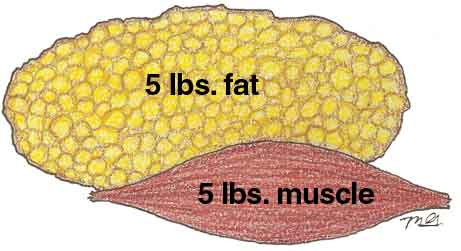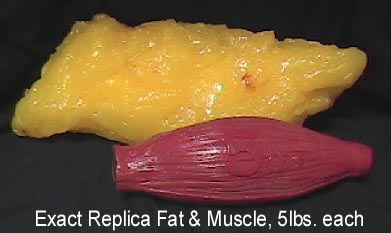Does muscle weigh more than fat?
 Tuesday, August 24, 2010 at 9:04 | by
Tuesday, August 24, 2010 at 9:04 | by  Darryl Edwards
Darryl Edwards How many times have you heard or even used the expression.
"Muscle weighs more than fat!"
Well it's not something I've really questioned before. But however you look at it - this phrase is misleading. A kilo of muscle and a kilo of fat placed on a scale would both weigh exactly the same. A kilo. It is something we come to terms with when comparing feathers and lead, but it seems subliminal to many with reference to body composition.
What people are really comparing is not weight, but density and volume. Muscle tissue has greater density than adipose (fat) tissue and so fat has a greater volume. Or more strictly speaking muscle has more weight by volume.
Imagine if a kilo of muscle was the size of a grapefruit, a kilo of fat would be 3 times larger. This could mean a significant difference to body composition, shape, size and health when the percentage of your body fat changes.

I've also been asked by clients:
"What exercises can I do to convert my excess fat into muscle?"
For clarification it is a complete myth that you can turn fat into muscle with training. It is also a myth that your muscle will turn into fat when a training regime subsides. Fat and muscle are completely different tissues. They have different composition and respond to training in different ways.
I will discuss this in more detail in a future post, but in simple terms:
- to decrease fat, make the right nutritional, activity and lifestyle choices;
- to increase muscle, overload muscles with resistance activity. Different training programs can be used to: increase strength, increase muscle size (hypertrophy), improve tone, density and efficiency (or all of these simultaneously);
- muscle cells burn more calories;
- fat cells store calories;
- focusing on body weight alone is not enough, a woman who weighs 60 kilos (9 stones 6 or 132lbs) and has 12% body fat will look completely different to a woman who weighs 60 kilos, but has a body fat percentage of 20%
 Darryl Edwards
Darryl Edwards
 Hi @Thor, this is an exact replica.
Hi @Thor, this is an exact replica.























Reader Comments